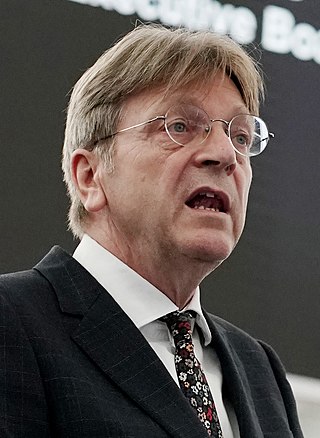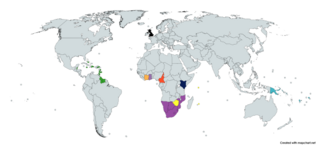Members

While membership of the group is not fixed, and its membership has varied throughout its history, the main members that have partaken in meetings of the Group include: [1] [4]
The JUSCANZ Group is an informal, information-sharing coalition of like-minded countries at the United Nations Human Rights Council and other United Nations bodies, such as the Third, Fourth Committees [1] [2] and the United Nations Conference on Trade and Development. In the United Nations Regional Grouping system, it is considered as a subsection of the Western European and Others Group (WEOG), as most of its members are members of that Group. Its aim is to counterbalance the sway of the European Union bloc in WEOG matters.
The name of the group is derived from the acronym of its founding members Japan, the United States, Canada, Australia and New Zealand. [3]
The Group's role is mainly to act as a tool for information-sharing at the United Nations. Unlike the United Nations Regional Groups, JUSCANZ is not a policy-coordination mechanism.[ citation needed ]
Members of the Group are not expected to reach consensus positions on issues. Rather, at JUSCANZ meetings, members meet to share information on the status of resolutions and to flag potential problems or issues for other delegations.[ citation needed ]

While membership of the group is not fixed, and its membership has varied throughout its history, the main members that have partaken in meetings of the Group include: [1] [4]
On 22 January 2010, Israel was permitted to join the Group for sessions at the United Nations Office at Geneva, but not at the United Nations Headquarters in New York, nor at the other two major office sites of Vienna and Nairobi. [8]
On 11 February 2014, Israel was allowed to join the Group in all relevant United Nations Committees at Headquarters in New York. [9]

Guy Maurice Marie Louise Verhofstadt is a Belgian liberal politician and an advocate of a Federal Europe. He is a former prime minister of Belgium. He has been a member of the European Parliament (MEP) from Belgium since 2009.

The United Nations Human Rights Council (UNHRC) is a United Nations body whose mission is to promote and protect human rights around the world. The Council has 47 members elected for staggered three-year terms on a regional group basis. The headquarters of the Council are at the United Nations Office at Geneva in Switzerland.

The Group of Western European and Other States, also known as the Western European and Other States Group or WEOG, is one of the five United Nations regional groups and is composed of 28 Member States mainly from Western Europe, but also from North America, the Eastern Mediterranean, Fennoscandia and Oceania.

Euroscepticism in the United Kingdom is a continuum of belief ranging from the opposition to certain political policies of the European Union to the complete opposition to the United Kingdom’s membership of the European Union. It has been a significant element in the politics of the United Kingdom (UK). A 2009 Eurobarometer survey of EU citizens showed support for membership of the EU was lowest in the United Kingdom, alongside Latvia and Hungary.

The United Nations Regional Groups are the geopolitical regional groups of member states of the United Nations. Originally, the UN member states were unofficially organized into five groups as an informal means of sharing the distribution of posts for General Assembly committees. Now this grouping has taken on a much more expansive and official role. Many UN bodies are allocated on the basis of geographical representation. Top leadership positions, including Secretary-General and President of the General Assembly, are rotated among the regional groups. The groups also coordinate substantive policy and form common fronts for negotiations and bloc voting.

Economic Partnership Agreements (EPAs) are a scheme to create a free trade area (FTA) between the European Union and other countries. They are a response to continuing criticism that the non-reciprocal and discriminating preferential trade agreements offered by the EU are incompatible with WTO rules. The EPAs date back to the signing of the Cotonou Agreement. The EPAs with the different regions are at different states of play. The EU has signed EPAs with the following countries: the Southern African Development Community (SADC), ECOWAS, six countries in Eastern and Southern Africa, Cameroon, four Pacific states, and the CARIFORUM states. Their defining characteristic is that they open up exports to the EU immediately, while exports to the partner regions is opened up only partially and over transitioning periods.
In international diplomacy, JACKSNNZ is the colloquial name of an informal grouping of the world's affluent non-EU countries, excluding the United States. The JACKSNNZ states are Japan, Australia, Canada, South Korea, Switzerland, Norway and New Zealand.

The European Union (EU) has permanent observer status at the United Nations (UN) since 1974, and gained enhanced participation rights in 2011. The EU itself does not have voting rights but it is represented alongside its 27 members, one of which, France, is a permanent member of the Security Council.

Relations between the European Union (EU) and the United Kingdom of Great Britain and Northern Ireland (UK) are governed, since 1 January 2021, by the EU–UK Trade and Cooperation Agreement (TCA).

Brexit was the withdrawal of the United Kingdom (UK) from the European Union (EU). Following a referendum on 23 June 2016, Brexit officially took place at 23:00 GMT on 31 January 2020. The UK is the only sovereign country to have left the EU. The UK had been a member state of the EU or its predecessor, the European Communities (EC), since 1 January 1973. Following Brexit, EU law and the Court of Justice of the European Union no longer have primacy over British laws. The European Union (Withdrawal) Act 2018 retains relevant EU law as domestic law, which the UK can amend or repeal.

Europe of Freedom and Direct Democracy was a Eurosceptic and populist political group in the European Parliament. The EFDD group was a continuation for the Eighth European Parliament of the Europe of Freedom and Democracy (EFD) group that existed during the Seventh European Parliament, with significant changes to group membership.

The 2016 United Kingdom European Union membership referendum took place in the United Kingdom and Gibraltar on 23 June 2016. Membership of the European Union had been a topic of political debate in the United Kingdom since the country joined the European Communities in 1973. This referendum was conducted very differently from the European Communities membership referendum in 1975; a more localised and regionalised counting procedure was used, and the ballot was overseen by the Electoral Commission, a public body which did not exist at the time of the first vote. This article lists, by voting area for Great Britain and Gibraltar and by parliamentary constituency for Northern Ireland, all the results of the referendum, each ordered into national and regional sections.
Brexit and arrangements for science and technology refers to arrangements affecting scientific research, experimental development and innovation that are within the scope of the negotiations between the United Kingdom and the European Union on the terms of Britain's withdrawal from the European Union (EU).

The United Kingdom's post-Brexit relationship with the European Union and its members is governed by the Brexit withdrawal agreement and the EU–UK Trade and Cooperation Agreement. The latter was negotiated in 2020 and has applied since January 2021.

The United Kingdom (UK) was a member of the European Economic Area (EEA) from 1 January 1994 to 31 December 2020, following the coming into force of the 1992 EEA Agreement. Membership of the EEA is a consequence of membership of the European Union (EU). The UK ceased to be a Contracting Party to the EEA Agreement after its withdrawal from the EU on 31 January 2020, as it was a member of the EEA by virtue of its EU membership, but retained EEA rights during the Brexit transition period, based on Article 126 of the withdrawal agreement between the EU and the UK. During the transition period, which ended on 31 December 2020, the UK and EU negotiated their future relationship.

In 2016, the impact of Brexit on the European Union (EU) was expected to result in social and economic changes to the Union, but also longer term political and institutional shifts. The extent of these effects remain somewhat speculative until the precise terms of the United Kingdom's post-Brexit relationship with the EU becomes clear. With an end to British participation in the EU's policies on freedom of movement of goods, persons, services, and capital, and the European Union Customs Union, as well as sharing criminal intelligence and other matters, there is a clear impact with consequences for both institutions.

This article outlines the predicted impact of Brexit, the withdrawal of the United Kingdom (UK) from the European Union (EU) and the European Atomic Energy Community.
The Republic of Türkiye is one of the 51 founding members of the United Nations when it signed the United Nations Conference on International Organization in 1945.
In this spirit of collaboration, I am also pleased to announce that the United Kingdom will, henceforth, be joining the JUSCANNZ regional grouping at UNCTAD.